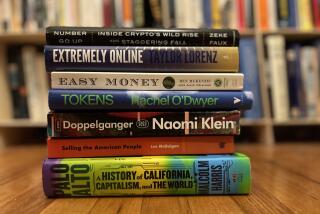Nassim Nicholas Taleb’s ‘Antifragile’ dares us to expect the unexpected
Antifragile
Things That Gain from Disorder
Nassim Nicholas Taleb
Random House: 544 pp., $30
Nassim Nicholas Taleb’s 2007 book “The Black Swan: The Impact of the Highly Improbable,” detailed the impossibility of predicting the future, which jerks forward by way of massive changes such as the Internet or 9/11. But thanks to “Swan’s” timing — published a year before the financial crisis — it appeared to do just that, preemptively offering a handbook to our institutions’ inability to handle the unexpected.
The book catapulted Taleb, a trader and quantitative analyst turned independent scholar, to guru status, flanked by $60,000 speaking fees and a spot on Bloomberg’s “Most Influential 50” list. Yet neither “The Black Swan” nor his previous book, “Fooled by Randomness,” his examination of how often we mistake luck for skill, offered any solutions for nations, businesses or individuals grappling with a world beset by unpredictability and volatility.
“Antifragile: Things That Gain from Disorder” offers an antidote to “The Black Swan” by explaining how to build systems that can actually benefit from stress. Taleb coins a new word for this unique kind of strength: antifragility.
By shielding treasured entities (children and our bodies, for example) against all disruptions, Taleb argues that we make them more fragile; by learning to survive small shocks like unrestricted free time and colds, we can graduate to the level between fragile and antifragile: robust. Unsanctioned adventure and antibodies make us stronger — not invincible but better able to handle life’s inevitable surprises.
Fragility is also a problem on a grander scale: Globalization, complexity and increased connectedness lead to more vulnerable systems. Taleb writes, “One problem somewhere can halt the entire project.”
Beyond fragile and robust lies the goal — antifragility — “the combination aggressiveness plus paranoia.” Such a combination leaves open the possibility of big rewards while minimizing exposure to negative risk. (An antifragile portfolio would contain 90% “boring cash” and 10% “maximally risky” investments.)
Some of Taleb’s advice is solidly practical. If you’re interested in a high-risk career such as acting, he suggests using “the barbell strategy” by pursuing acting along with another stable career, like accounting, thereby exposing yourself to maximum positive risk. In the worst-case scenario, you’re a respectable accountant engaged in the local theater scene; at best, a superstar actor who never had to starve.
In the realm of science, he applauds aimless research and the all-important happy accident, arguing that we often squash the potential of randomness because researchers study increasingly narrow fields. “Knowledge, or what is called ‘knowledge,’ in complex domains inhibits research.”
But readers will only digest these sizable granules of wisdom if they can stomach Taleb himself. His Everest-sized ego gives the book the tone of a brilliant dinner party guest off his meds.
Taleb’s unrelenting certainty in his own ideas is also his greatest weakness and with such self-conviction comes boulder-sized blind spots. He repeatedly disparages the entire discipline of psychology while liberally claiming that others are prone to cognitive quirks, like hindsight bias and the halo effect. While “Antifragile” rails against “the idiocy of predictive systems” and anyone claiming foresight, he alleges to have predicted the financial crisis of 2009 “to anyone who would listen to me.”
Taleb is frequently dismissive of and hostile toward the usual suspects: authority and institutions. The book takes shots at the financial industry, academia and the social sciences. For example, political science and economics, he writes, “have never produced anything of note.” His bluntness is refreshing at its best, but the derision and ego grow tiresome over 500 pages.
“Antifragile” is divided into six sections, or “books,” weaving in Greek thinkers and personal anecdotes, medicine and mathematics, world history and government. Taleb simultaneously builds his case and presents it from many angles, giving it a lyrical, symphonic structure.
Detractors will call it disorganized and anti-linear; and it’s true, this scattershot approach comes at the expense of fully developing his ideas sometimes. Yet it works for the most part, exemplifying the way form follows function.
One common affliction responsible for fragility in the world, writes Taleb, is neomania, the “love of the modern for its own sake.” We are constantly in pursuit of the next big thing but how can you know that something will last if it’s only been around for a year, offering no information on its future longevity?
Time is nature’s greatest filter, eliminating all but the antifragile, meaning that what is oldest today — be it a canonical book, a long-running Broadway show, or the game of chess — has stood the test of time and isn’t likely to disappear any time soon whereas the books and games released tomorrow may become outdated and irrelevant in a year.
So how do we know if we can put any stock in the bold new ideas of “Antifragile?” It’s a classic Taleb move: At once thought-provoking and brilliant, this book dares you not to read it.
Starr has written for Slate and the Atlantic and is currently working on a book about the science of luck.
More to Read
Sign up for our Book Club newsletter
Get the latest news, events and more from the Los Angeles Times Book Club, and help us get L.A. reading and talking.
You may occasionally receive promotional content from the Los Angeles Times.






